Monthly Report to the Dean - February 2011
Alaska Sea Grant
Research, Education Services, and the Marine Advisory Program
Monthly Report, February 2011
David Christie, Director • Paula Cullenberg, Associate Director
Update: Julie Matweyou has been hired as the new Kodiak Marine Advisory agent. She will begin work on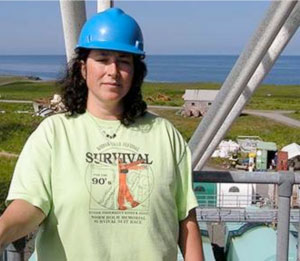 March 14. Julie is a commercial longliner, and has worked for Bristol Environmental. She earned her MS in biological oceanography from UAF studying PSP, as an ASG-funded student.
March 14. Julie is a commercial longliner, and has worked for Bristol Environmental. She earned her MS in biological oceanography from UAF studying PSP, as an ASG-funded student.
On the schedule:
March 21-26 W.Alaska Interdisciplinary Science Conference, Bethel
March 22-24 Copper River Delta Science Symposium, Cordova
March 29 Marine Refrigeration Workshop, Anchorage
April 9-12 Kodiak Area Marine Science Symposium, Kodiak
Sept. 8-11 Tongass Rainforest Festival, Petersburg
Sept. 14-17 Fishing People of the North, Wakefield Symposium, Anchorage
December Alaska Young Fishermen’s Summit
Highlights from February:
Healthy Coastal Ecosystems
Sunny Rice recruited JoAnn Day, a Petersburg middle school teacher, to take part as a citizen-scientist during this spring’s research on sea otters in southeast Alaska. The research is a partnership among ASG, MAP, SFOS, USFWS, and southeast Alaska fishing organizations. JoAnn will interact with scientists and take what she learns back to her classroom.
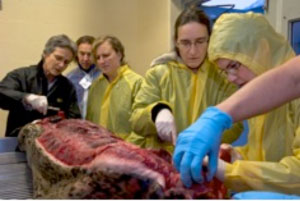 Eight MAP faculty members attended the Alaska Marine Mammal Stranding Network meeting in Seward. Kate and Reid Brewer presented annual summaries of stranding responses in their regions. Following the meeting, Kate trained the MAP agents to respond to marine mammal strandings statewide. This photo shows Kate Wynne, Reid Brewer, Sunny Rice, Gay Sheffield, and Izetta Chambers engaged in a harbor seal necropsy. Gary Freitag, Terry Reeve, Torie Baker, and Bree Witteveen also participated.
Eight MAP faculty members attended the Alaska Marine Mammal Stranding Network meeting in Seward. Kate and Reid Brewer presented annual summaries of stranding responses in their regions. Following the meeting, Kate trained the MAP agents to respond to marine mammal strandings statewide. This photo shows Kate Wynne, Reid Brewer, Sunny Rice, Gay Sheffield, and Izetta Chambers engaged in a harbor seal necropsy. Gary Freitag, Terry Reeve, Torie Baker, and Bree Witteveen also participated.
In Unalaska, Reid responded to the second sea otter stranding in 6 months, and an elephant seal stranding. He sent the sea otter to USFWS for evaluation and necropsy, and sent a report on the seal to the NMFS Office of Protected Resources.
Kate Wynne attended the NOAA Alaska Scientific Review Group (AKSRG) meeting in Seattle: reviewed the status of 12 marine mammal stocks, received research updates from NMFS personnel, and helped draft a white paper promoting mitigation of marine mammal-fishery interactions through work with fishing organizations during the NMFS Alaska Scientific Review Group meeting in Seattle.
Kate conducted a monthly aerial survey of marine mammals in northern Kodiak waters for GAP09 including an added leg flown to Tugidak Island to monitor winter distribution. Kate invited KMXT reporter Jacob Resnick to fly along on the survey, which he worked into a story that aired on Mar. 7. http://www.kmxt.org/index.php?option=com_content&task=view&id=2575&Itemid=2
Sustainable Coastal Development
MAP and the Southwest Alaska Municipal Conference hosted the workshop, Vibrant Economies: A Workshop for Alaska’s Rural Coastal Communities, during the annual SWAMC meeting in Anchorage, for about 40 residents of the region. Terry Johnson gave a talk on tourism business development in southwest Alaska, Quentin Fong and Chuck Crapo presented a seafood processing perspective, Ray RaLonde spoke on shellfish farming in western Alaska and Glenn Haight addressed succession of the next generation in the fishing fleet. Paula Cullenberg moderated the presentations and discussion groups.
Safe and Sustainable Seafood Supply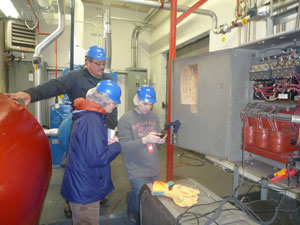
Chuck Crapo and Torie Baker conducted seafood processing plant energy audits in Kodiak for Ocean Beauty Seafoods and Alaska Pacific Seafoods with Joel Bailey, from the UAF Institute of Northern Engineering. They also tested energy audit do-it-yourself kits designed for smaller processors to use themselves. Reducing energy costs to the state’s seafood operations is the focus of a two-year project funded by the Alaska Energy Authority.
ASG-funded student David Runfola scheduled his master’s thesis defense for March 11—Combining Traditional Knowledge and Fisheries Science in a Study of Bering Cisco Coregonus laurettae in the Yukon River Delta, Alaska. His research indicates that juvenile Bering cisco rear in the coastal marine delta, where they feed on sticklebacks. Interviews demonstrated the need for greater awareness of traditional knowledge, and the importance of communicating this knowledge to fisheries scientists.
A Marine Refrigeration workshop was held in Petersburg, with 21 fishermen participating. The hands-on work took place at the Petersburg Community Cold Storage. Torie Baker and Sunny Rice, principal workshop organizers, also arranged for 11 students in the high school aquaculture class to spend 1.5 hours with the Integrated Marine Systems instructor.
Kate presented training on marine mammal identification and recording for NMFS groundfish observers at the Observer Training Center in Anchorage, to 16 people.
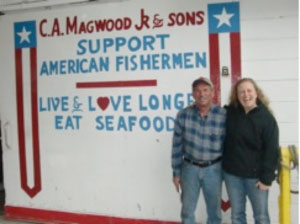 Sunny traveled to South Carolina at the invitation of SC Sea Grant, where she presented information on the Petersburg Community Cold Storage
Sunny traveled to South Carolina at the invitation of SC Sea Grant, where she presented information on the Petersburg Community Cold Storage
project, direct marketing, and MAP FishBiz spreadsheets, to 30 local shrimpers at TAA workshops in Georgetown and Beufort. She also spoke on community cold storage to about 220 participants at the SC Seafood Summit.
Chuck Crapo offered technical assistance to a Seattle seafood processor on utilization of sockeye salmon bellies, a Juneau smoker on retort pouch production, a Fairbanks hot sauce producer providing process validation, a Talkeetna small processor interested in developing baby food from local produce, a Vietnamese seafood processor interested in the coloration of flaked pink salmon products, a Seward processor on thermal processing in retort pouches and glass jars, aWrangell processor on king crab processing times and procedures, a Quinhagak processor for HACCP methods, an Elfin Cove processor for HACCP and sanitation plans, California Sea Grant on distance delivery for HACCP training, Seattle processor on energy audit opportunities, and a Kodiak processor on smoked salmon quality problems and establishing sanitation procedures.
Hazard Resilience in Coastal Communities
Ray gave a talk at the Alaska Forum on the Environment on Harmful Algae Blooms: Activities and Impacts. Ray is doing data analysis and writing the final report for an NPRB project, Using Blue Mussels as an Indicator Species for Testing Domoic Acid Toxicity in Subsistence Bivalve Harvest.
Torie co-taught a 10-hour AMSEA drill conductor certification course for commercial fishermen and other boaters. to 12 participants including two first-year commercial fish permit holders, two refreshers, and two marine researchers new to Alaska waters.
Paula chaired the annual meeting of the AMSEA board of directors in Juneau. With the upcoming rulemaking for the new Coast Guard bill, AMSEA will need to gear up for increased training of commercial fishermen. They also held a 25th year reception in Juneau. Paula was elected board chair for another year.
Marine Literacy and Stewardship
ASG was well represented at the Tsunami Bowl in Seward Feb. 3-6. Paula joined the judging team for the research presentations. Carol Kaynor, Dave Christie, Dave Partee, Kurt Byers, Karina Gonzalas, and Asia Beder formed a Quiz Bowl judging team, which also was selected to officiate the final round of the competition. The Petersburg team coached by Sunny Rice and Joni Johnson took third place in the knowledge quiz. Reid Brewer coached two teams from Unalaska, and Gary Freitag coached a team from Ketchikan.
Gross income from sales of ASG educational products for February was over $5,200. About 2,050 publications were distributed. Customer feedback quote of the month: “I purchased several books to help me gain more knowledge about seafood species in the North Pacific. I'm starting my own smoked products with seafoods from North Pacific and Atlantic, and so I will need more education, knowledge and learning.” —Surabaya, Indonesia. (International Smoked Seafood Conference Proceedings, Alaska's Ocean Bounty Poster—Japanese, Field Guide to Common Marine Fishes and Invertebrates of Alaska)
News releases by Doug Schneider distributed in February highlighted new Nome MAP agent Gay Sheffield, a fishing vessel refrigeration workshop in Anchorage, a fishing training program survey, and the Tsunami Bowl. ASG/MAP news items were placed in the Dutch Harbor Fisherman, KFSK-Petersburg,KMXT-Kodiak, Alaska Business Monthly, Fairbanks Daily News-Miner, Alaska Public Radio Network, Nome Nugget, Bristol Bay Times, Kodiak Daily Mirror, Juneau Empire, Pacific Fishing, FishNewsEU, and elsewhere.
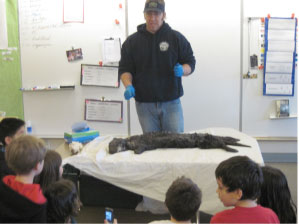 Reid led an outreach effort with elementary students who have completed the Alaska Seas and Rivers curriculum, “The Case of the Missing Sea Otter.” (http://seagrant.uaf.edu/marine-ed/curriculum/grade-4.html) Reid brought in a dead stranded sea otter, and talked about biology, ecology, and life history.
Reid led an outreach effort with elementary students who have completed the Alaska Seas and Rivers curriculum, “The Case of the Missing Sea Otter.” (http://seagrant.uaf.edu/marine-ed/curriculum/grade-4.html) Reid brought in a dead stranded sea otter, and talked about biology, ecology, and life history.
Administrative
Dave Christie attended the annual spring meeting of the Sea Grant Association in Washington, D.C. The highlight was the reception for about 200 Knauss fellows; Alaska fellow Celeste Leroux was present. Another Knauss alum, Cynthia Suchman, will be coming north in June to replace Clarence Pautzke as director of NPRB. Conversation at SGA was heavily focused on the federal budget.
Gary Freitag and Izetta Chambers attended the National Sea Grant Academy in Silver Spring, Maryland. The Academy brings together Sea Grant extension agents from across the country for professional development. Paula Cullenberg will be one of the instructors at part two of the Academy this fall.
The ASG research review panel met in Anchorage Feb. 25 to select research pre-proposals eligible to be developed into full proposals. The panel reviewed 34 pre-proposals; from these, 13 full proposals will be requested from submitters, due April 22, 2011.
Rapid Response
MAP faculty answered queries on brown crab cooking, sea otters and pickling seafood, they also assisted Digital Signal Labs, did bird surveys and sampled for invasive mussels, advised graduate students, and wrote letters of recommendation.


